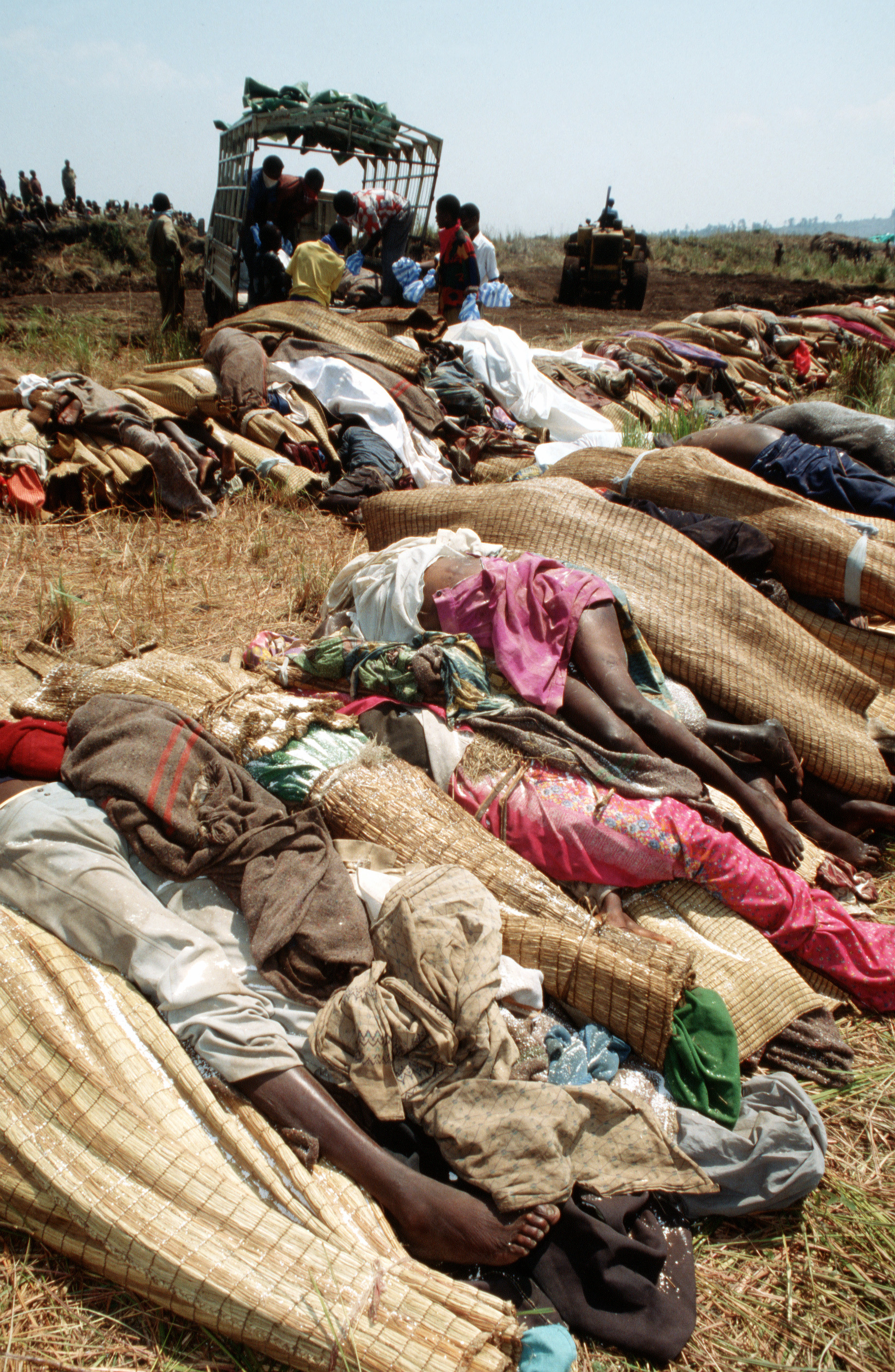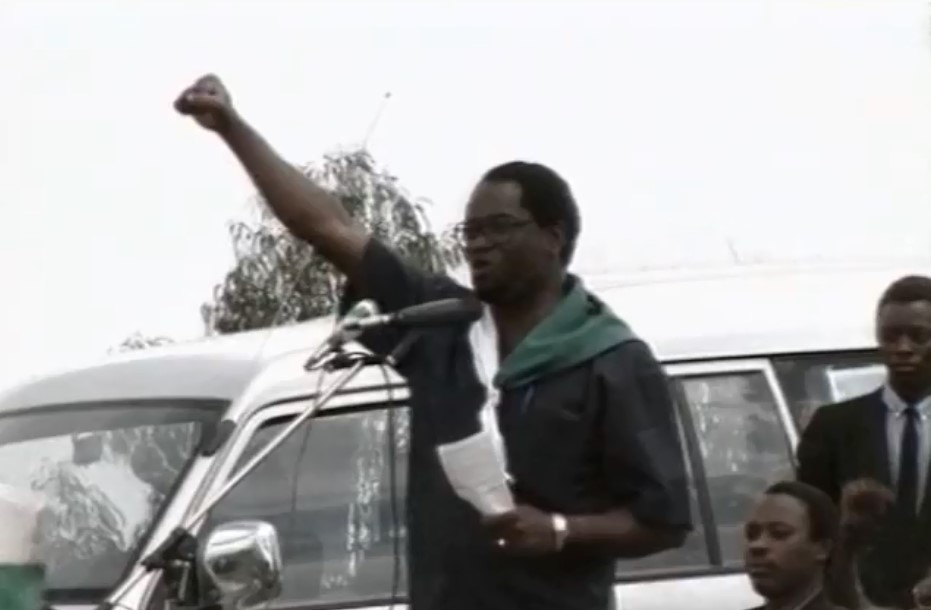|
Great Lakes Refugee Crisis
The Great Lakes refugee crisis is the common name for the situation beginning with the exodus in April 1994 of over two million Rwandans to neighboring countries of the Great Lakes region of Africa in the aftermath of the Rwandan genocide. Many of the refugees were Hutu fleeing the predominantly Tutsi Rwandan Patriotic Front (RPF), which had gained control of the country at the end of the genocide. However, the humanitarian relief effort was vastly compromised by the presence among the refugees of many of the Interahamwe and government officials who carried out the genocide, who used the refugee camps as bases to launch attacks against the new government led by Paul Kagame. The camps in Zaire became particularly politicized and militarized. The knowledge that humanitarian aid was being diverted to further the aims of the genocidaires led many humanitarian organizations to withdraw their assistance. The conflict escalated until the start of the First Congo War in 1996, when RPF-su ... [...More Info...] [...Related Items...] OR: [Wikipedia] [Google] [Baidu] |
Rwandan Refugee Camp In East Zaire
Rwandan or Rwandese may refer to: * Related to, from, or connected to Rwanda, a country in Africa * Banyarwanda, inhabitants of the country Rwanda and those of Rwandan ethnicity. * Kinyarwanda, the language of the Banyarwanda, sometimes known as the Rwandan language. See also * Rwandan cuisine * Rwandan music * Rwandan genocide {{disambig Language and nationality disambiguation pages ... [...More Info...] [...Related Items...] OR: [Wikipedia] [Google] [Baidu] |
List Of African Countries By Population Density
This is a list of African countries and dependencies by population density in inhabitants/km2. Saint Helena, being closest to Africa, has been included. See also *List of African countries by population *List of African countries by GDP *Demographics of Africa References {{Reflist Lists of countries in Africa, Population Density Lists of countries by population density, Africa Lists by population density, Africa ... [...More Info...] [...Related Items...] OR: [Wikipedia] [Google] [Baidu] |
Burundian Civil War
The Burundian Civil War was a civil war in Burundi lasting from 1993 to 2005. The civil war was the result of longstanding ethnic divisions between the Hutu and the Tutsi ethnic groups. The conflict began following the first multi-party elections in the country since its independence from Belgium in 1962, and is seen as formally ending with the swearing-in of President Pierre Nkurunziza in August 2005. Children were widely used by both sides in the war. The estimated death toll stands at 300,000. Background Before becoming subject to European colonial rule, Burundi was governed by an ethnic Tutsi monarchy, similar to that of its neighbor Rwanda. German, and subsequently Belgian, colonial rulers found it convenient to govern through the existing power structure, perpetuating the dominance of the Tutsi minority over the ethnic Hutu majority. The Belgians generally identified the ethnic distinctions in Burundi and Rwanda with the following observations: the Twa who were shor ... [...More Info...] [...Related Items...] OR: [Wikipedia] [Google] [Baidu] |
Melchior Ndadaye
Melchior Ndadaye (28 March 1953 – 21 October 1993) was a Burundian intellectual and politician. He was the first democratically elected and first Hutu president of Burundi after winning the landmark 1993 Burundi presidential election, 1993 election. Though he moved to attempt to smooth the country's bitter ethnic divide, his reforms antagonised soldiers in the Tutsi-dominated army, and he was assassinated amidst a failed military coup in October 1993, after only three months in office. His assassination sparked an array of brutal tit-for-tat massacres between the Tutsi and Hutu ethnic groups, and ultimately sparked the decade-long Burundi Civil War. Early life Melchior Ndadaye was born on 28 March 1953 in the commune of Nyabihanga, Ruanda-Urundi. The son of Pie Ndadaye and Thérèse Bandushubwenge, he was the first of ten children in a Hutu family. He attended primary school in Mbogora and in 1966 enrolled at the normal school in Gitega. Following the 1972 Ikiza, in which the g ... [...More Info...] [...Related Items...] OR: [Wikipedia] [Google] [Baidu] |
Arusha Accords (Rwanda)
The Arusha Accords, officially the ''Peace Agreement between the Government of the Republic of Rwanda and the Rwandan Patriotic Front'', also known as the Arusha Peace Agreement or Arusha negotiations, were a set of five accords (or protocols) signed in Arusha, Tanzania on 4 August 1993, by the government of Rwanda and the rebel Rwandan Patriotic Front (RPF), under mediation, to end a three-year Rwandan Civil War. Primarily organized by the Organisation of African Unity and the heads of state in the African Great Lakes region, the talks began on 12 July 1992, and ended on 4 August 1993, when the accords were finally signed. Agreements The Arusha Accords envisioned the establishment of a Broad-Based Transitional Government (BBTG), which would include the insurgent RPF and the five political parties that had composed a temporary government since April 1992 in anticipation of general elections. The Accords included other points considered necessary for lasting peace: the rule of ... [...More Info...] [...Related Items...] OR: [Wikipedia] [Google] [Baidu] |
Rwandan Genocide Murambi Skulls
Rwandan or Rwandese may refer to: * Related to, from, or connected to Rwanda, a country in Africa * Banyarwanda, inhabitants of the country Rwanda and those of Rwandan ethnicity. * Kinyarwanda, the language of the Banyarwanda, sometimes known as the Rwandan language. See also * Rwandan cuisine * Rwandan music * Rwandan genocide {{disambig Language and nationality disambiguation pages ... [...More Info...] [...Related Items...] OR: [Wikipedia] [Google] [Baidu] |
Internally Displaced Person
An internally displaced person (IDP) is someone who is forced to leave their home but who remains within their country's borders. They are often referred to as refugees, although they do not fall within the legal definitions of a refugee. At the end of 2014, it was estimated there were 38.2 million IDPs worldwide, the highest level since 1989, the first year for which global statistics on IDPs are available. As of 3 May 2022 the countries with the largest IDP populations were Ukraine (8 million), Syria (7.6 million), Ethiopia (5.5 million), the Democratic Republic of the Congo (5.2 million), Colombia (4.9 million), Yemen (4.3 million), Afghanistan (3.8 million), Iraq (3.6 million), Sudan (2.2 million), South Sudan (1.9 million), Pakistan (1.4 million), Nigeria (1.2 million) and Somalia (1.1 million). The United Nations and the UNHCR support monitoring and analysis of worldwide IDPs through the Geneva-based Internal Displacement Monitoring Centre. Definition Whereas 'refugee ... [...More Info...] [...Related Items...] OR: [Wikipedia] [Google] [Baidu] |
Ruhengeri
Ruhengeri, also known as Musanze or Muhoza, is a city and capital of Musanze District in the Northern Province of Rwanda. Some sources now refer to the city itself as Musanze, after the district in which it lies within. This has to do with the adopted policy of renaming Rwanda cities, which was done to eliminate memories of the past and to install new administrations in the country. Ruhengeri lies near the twin lakes of Lake Burera and Lake Ruhondo and is the gateway city to Volcanoes National Park and the famous mountain gorillas in the north-western part of the country. The city's proximity to the Volcanoes National Park Volcanoes National Park is a national park in northwestern Rwanda. It covers of rainforest and encompasses five of the eight volcanoes in the Virunga Mountains, namely Karisimbi, Bisoke, Muhabura, Gahinga and Sabyinyo. It borders Virunga N ... has made it a popular tourist destination with several restaurants and hotels mainly aimed at visitors to the ... [...More Info...] [...Related Items...] OR: [Wikipedia] [Google] [Baidu] |
Umutara
Until January 2006, Umutara Province was one of the 12 provinces (''intara'') of Rwanda. However, due to local government reorganization, this area is now part of the new larger Eastern Province. The old province was situated in the north-east of the country, bordering Uganda to the north and Tanzania to the east. Within Rwanda it borders Kibungo to the south and Byumba to the west. The province was made up of districts and 81 Sectors, with its capital at Nyagatare. Umutara was formed as a prefecture in 1996 from parts of Byumba and Kibungo. Umutara had an area of 4,250 square kilometers, most of which is grasslands. The population in 2005 was 421,600. See also * Umutara Polytechnic Umutara Polytechnic (UP) was a higher education institution in Rwanda. Founded in 2004, was located in the city of Nyagatare, capital of Nyagatare district in Eastern Province, Rwanda. UP started its first academic year on 2 May 2006 with 265 ... External links rwandagateway.org Form ... [...More Info...] [...Related Items...] OR: [Wikipedia] [Google] [Baidu] |
Byumba
Byumba is a city in northern Rwanda, and is the capital of Gicumbi District. It is home to an SOS Children's Village. The city lies about , north of the capital Kigali. This location lies approximately , south of the International border with Uganda at Gatuna. Population , the human population in Byumba was estimated at 75,463. Economic activity Banque Populaire du Rwanda (BPR), maintains a branch in Byumba. Education * University of Technology and Arts at Byumba ( UTAB) Notable people * Marie Béatrice Umutesi, writer * Donald Kaberuka Donald P. Kaberuka (born 5 October 1951) is a Rwandan economist and was the president of the African Development Bank from September 2005 until September 2015. Early life and education Kaberuka was born in Byumba, Rwanda. He studied at the Unive ..., economist References External linksFor population [...More Info...] [...Related Items...] OR: [Wikipedia] [Google] [Baidu] |
President Of Uganda
The president of the Republic of Uganda is the head of state and the head of government of Uganda. The president leads the executive branch of the government of Uganda and is the commander-in-chief of the Uganda People's Defence Force. The incumbent Yoweri Museveni came to power in 1986 and is the longest serving president of Uganda, ahead of Idi Amin who ruled from 1971 to 1979. Bobi Wine has not conceded the 2021 election and claims his victory is disputed for the 2021 Ugandan general election. Qualifications In 2005 presidential term limits were removed, and in 2017, the removal of the previous upper age limit of 75 was also announced. Qualifications of the President. (Article 102) A person to qualify for election as President must be— *(a) a citizen of Uganda by birth; *(b) not less than thirty-five and not more than seventy-five years of age; and *(c) qualified to be a member of Parliament. List of presidents of Uganda (1962–present) See also *List of heads of ... [...More Info...] [...Related Items...] OR: [Wikipedia] [Google] [Baidu] |

